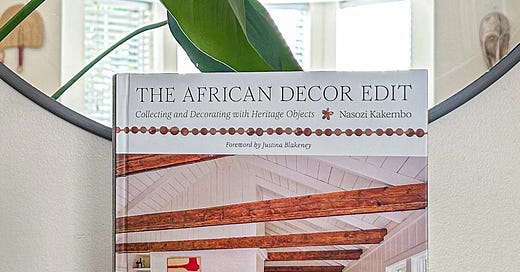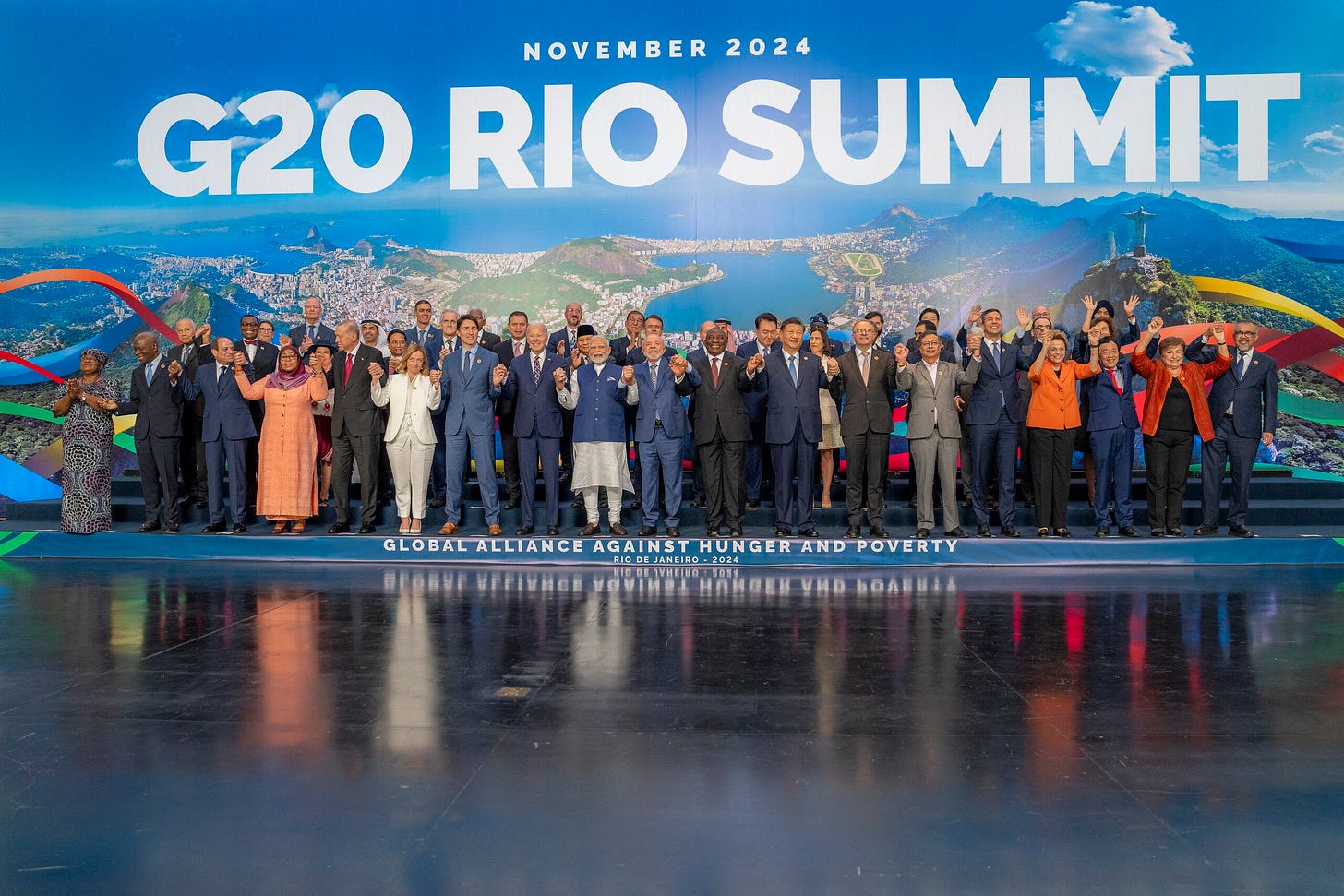🔅 Down With Minimalism: Celebrating African Design
South Africa's G20 Presidency & Jubaland and Mogadishu's Political Tug-of-War

Good Morning from Mauritania!
Last Week in Numbers
Year-to-Date Performance:
🟢 Johannesburg SE: 84,510.44 (+9.91%)
🟢 Nigerian SE: 97,506.87 (+30.04%)
🟢 Nairobi SE: 111.53 (+21.08%)
🟢 Ghana SE: 4,694.37 (+49.97%)
🟢 US S&P 500: 6,032.38 (+27.19%)
🟢 Shanghai Composite: 3,326.46 (+12.29%)
🇪🇸 300,000: Spain to legalize 300,000 undocumented migrants annually from May, aiming to boost its aging workforce. PM Sánchez calls it a solution to the low birthrate.
🇧🇼 Cannabis: Diamonds are forever, but Botswana is branching out! President Boko bets on medicinal cannabis and solar energy to wean off diamond dependency. Shine on, Botswana!
🇳🇬 3.46%: Nigeria’s economy speeds up to 3.46% in Q3, but still far from Tinubu’s ambitious 6% target. A sprint, not yet a marathon for Africa’s giant.
🇺🇸 $600K: Gen Z in the U.S. thinks $600,000 is the ticket to financial success. Boomers settle for $100,000. Meanwhile, Africa averages under $10,000. Perspective is priceless, no?
🇿🇼 81%: Zimbabwe's debt-to-GDP ratio, with total debt reaching $21 billion. The country has now proposed a $331 million package to compensate white farmers as part of its strategy to return to international capital markets. Meanwhile, 6% is Zimbabwe's ambitious economic growth target for 2025, up from 2% this year, banking on improved agricultural output and power generation despite ongoing challenges.
🇬🇭 $500 Million: Upfront payments made by international buyers to Ghana's Cocobod, marking a historic shift from traditional bank financing as the regulator adapts to financial challenges in the cocoa sector.
🇺🇬 15 Dead: Landslides in eastern Uganda claim at least 15 lives and bury 113 people. Nature’s fury strikes Bulambuli, leaving devastation and grief in its wake.
🇦🇴 41%: Alrosa's stake in Angola's state-owned diamond mining operations, now sold to an Omani-backed fund ahead of Biden's visit, signaling Luanda's potential pivot from Moscow to Washington.
🌍 35 Million: Internally displaced people in Africa today, a dramatic threefold increase from 11.6 million in 2009. Wars and climate disasters have driven this surge, despite African governments' landmark deal to tackle displacement causes.
🇫🇷 Orange AI: Orange teams with Meta and OpenAI to train AI in African languages like Wolof and Pulaar. Tech for the people, with a local twist!
🇿🇦 7: Number of exploration wells TotalEnergies seeks to drill off South Africa's west coast, joining other oil majors like Shell in the promising Orange Basin.
*Data accurate as of the close of markets across the continent
Down With Minimalism: Celebrating African Heritage Design
Move over, minimalism – there's a new design aesthetic in town, and it's all about celebrating the heritage of the African continent.
Enuma Kakembo is the mastermind behind "The African Decor Edit: Collecting and Decorating with Heritage Objects." This new book is putting together African design principles and contemporary decor in a way that's both respectful and downright fabulous.
Kakembo's own journey into the world of African-inspired design started with a trip to a fabric market in Senegal. Overwhelmed by the volume of fabrics, she bought a few pieces to take home and had a "creative explosion" on the plane ride back. Before she knew it, she was sewing pillows and selling them at festivals and markets in Brooklyn and the Lower East Side.
What started as a pillow business blossomed into XN Studio. It is a design business that incorporated Kakembo's own creations as well as items she'd bring back from her trips to Africa.
And for "The African Decor Edit," Kakembo spent years traveling the continent, visiting artisans she already knew and discovering new creators through her network. The result? A book that showcases everything from hand-carved stools and Juju feather hats from Cameroon to cotton weavings from Ethiopia and batik textiles from Ghana.
But for Kakembo, it's not just about creating a beautiful home – it's about righting the wrongs of a system that has long extracted African cultural heritage without benefit to the people who created it. "So much has been taken out of Africa without any Africans benefiting from that extraction of their cultural heritage," she said. "This is a piece of the puzzle to right the course of what continues to be a really imbalanced economic picture."
Kakembo hopes to encourage readers to take respectful risks in their home design choices and to support small businesses that work directly with African artisans. It's a call to action for lovers and consumers of African and African-inspired design to embrace the heritage of the continent and make it a part of their everyday lives.
Jubaland and Mogadishu's Political Tug-of-War
A lot has been happening between Somalia's semi-autonomous Jubaland state and the federal government in Mogadishu.
The trouble started when Jubaland re-elected regional president Ahmed Mohamed Islam Madobe for a third term on Monday. Mogadishu wasn't too thrilled about this, claiming the election was held without federal involvement.
Jubaland, known as Somalia's breadbasket and home to the strategically important port of Kismayo, isn't backing down. They've officially suspended all relations and cooperation with the federal government, accusing President Hassan Sheikh Mohamud of everything from violating the constitution to fueling clan conflicts.
Since then, Mogadishu has issued an arrest warrant for Madobe, while Jubaland clapped back with their own warrant for President Mohamud.
This feud is happening against the backdrop of Mogadishu's already strained relationship with Somaliland, another region seeking international recognition as an independent country.
As for the execution of those arrest warrants, it's anyone's guess. Both Madobe and Mohamud have large numbers of troops at their command, so it could get messy. The national government has already dispatched additional troops to Jubaland in response to the election.
It's not the first time Jubaland and Mogadishu have butted heads. In 2021, Jubaland was among other regional governments that nearly clashed with the national government over plans to extend the then president's time in office.
South Africa’s G20 Presidency: A Big Deal or a Diplomatic Jungle Gym?
South Africa took over the G20 presidency this Sunday, officially becoming the first African nation to lead the global superclub. Think of it as a big moment for the continent—but also a bit like being handed the wheel of a very messy bus ride.
Here’s President Cyril Ramaphosa to-do list:
Inclusive economic growth (translation: “Can we stop leaving half the world behind, please?”)
Food security
Climate change (cue tumbleweed rolling past certain world leaders).
Artificial intelligence
Details will drop this week, but these are all issues that matter to Africa’s development—and, honestly, the world. Ramaphosa also plans to build on efforts by the recent G20 heads, which has rotated through the other BRIC members these past few years – Indonesia, India, and Brazil. So far, so good.
But global geopolitics is a mess right now. Imagine sitting at a dinner table where the U.S., China, and Russia are side-eyeing each other over trade wars, actual wars, and everything in between. Now imagine trying to steer that group into agreement on anything. Fun, right?
Trade wars looming: Incoming U.S. president Donald Trump is already hinting at tariffs that could reignite protectionism.
Climate denial 2.0: Trump also isn’t exactly known for loving climate policies, which means South Africa might have to yell into the void on that front.
South Africa’s presidency also comes with some extra homework: consolidating the Global South’s positions before the U.S. and Trump himself takes over in 2025. The goal? Lock in a legacy on issues like sovereign debt reform and global trade fairness, so no one can just hit “undo.”
With the G20 representing 85% of the world’s economy and two-thirds of its population, this is a major moment for South Africa to shine. But let’s face it, this presidency is happening in a polarized world.
Stay tuned.
Food for Thought
“If you do what you should not do, you will see what you should not see.”
— Ghanaian Proverb






